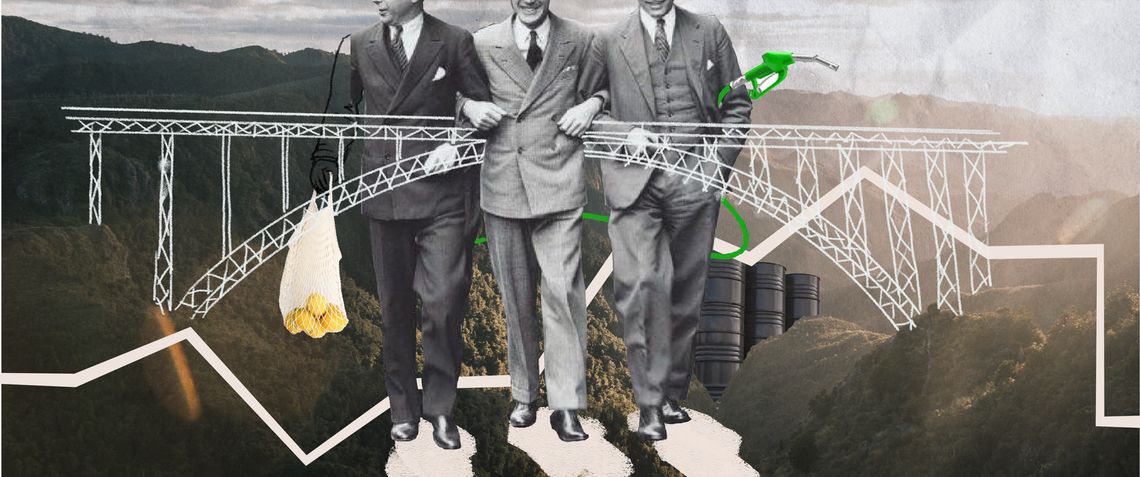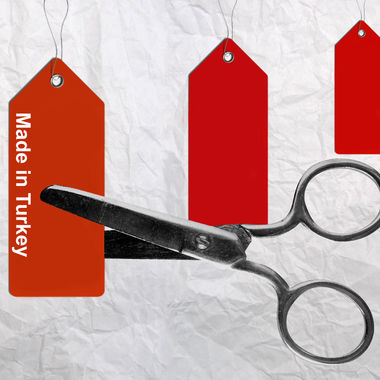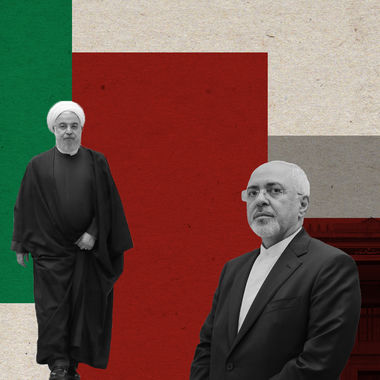
Illustration by Armine Shahbazyan.
The geographic and geopolitical landscape around Armenia is very complex, and the recent war in Artsakh compounded it even more. Sandwiched in an East-West blockade between Turkey and Azerbaijan for over a quarter century, Armenia has only two open borders with its neighbors Georgia and Iran. The war in Artsakh showcased the vulnerability of such a fragile logistics system. Since the resumption of the Azerbaijani-Turkish hostilities against Artsakh, the Georgian government has banned the issuance of permits for the transportation of military cargo to Armenia and Azerbaijan. Though the Armenian side has noted that Turkish weaponry had been transferred to Azerbaijan through Georgian territory, this was denied by the Georgian side. However, it should be noted that Turkey, Georgia and Azerbaijan institutionalized their triangle long before the renewed Artsakh war and have established deep roots of cooperation.
The relations between the three countries are based on three main pillars - the Baku-Tbilisi-Ceyhan oil pipeline, the Baku-Tbilisi-Erzurum natural gas pipeline and transportation cooperation. First and foremost, the impetus for the trilateral cooperation was the “Contract of the Century,” which enabled Azerbaijani oil to be exported to the global market. Though there were other route options on the table, the 1,768 km Baku-Tbilisi-Ceyhan (BTC) pipeline was chosen, bypassing Armenia. The functioning of the pipeline since 2006 had a significant political and especially economic role for Azerbaijan and Georgia. The Georgian economy annually earns $50 million and Turkey approximately $140-300 million in transit fees. This money represents an especially significant impact for Georgia, which has a smaller overall economy compared to Turkey. The functioning of the pipeline greatly contributed to economic growth in Azerbaijan, considering oil price increases throughout the mid-2000s.
The second pillar is the Baku-Tbilisi-Erzurum (BTE) natural gas pipeline. The export of Caspian gas reinforced the further development of the trilateral relationship. The BTE natural gas pipeline is vital for Georgia and Turkey to meet their internal demand needs. The discussions on constructing this pipeline started after the discovery of massive reserves in the Azerbaijani Shah Deniz gas field in 1999. On February 7, 2007, the presidents of Azerbaijan, Turkey and Georgia adopted the Tbilisi Declaration on a “common vision for regional cooperation,” which aimed to ensure the long-term energy security of the region. Thus, the three states expanded beyond energy cooperation and made political commitments to each other. The BTE pipeline entered full operation in 2007.
Georgia negotiated an allowance to 5% of the transited gas at no charge and an additional 500 million cubic meters at a discounted price. After the completion of the Southern Gas Corridor (SGC), the date for which is still unclear, Georgia will receive an additional 1 billion cubic meters at no charge.
The energy security of the three countries also provides a foundation for their economic development. For instance, the SGC envisions an $8 billion investment in Turkey and $2 billion in Georgia, which is the biggest single investment in Georgia’s history. British Petroleum and its partners are the main investors in the project.
The third pillar on which the trilateral partnership is based is cooperation on transportation. The successful cooperation in the field of energy gave an impetus to continue and develop cooperation in the transportation sphere. On May 25, 2005, the presidents of Azerbaijan, Georgia and Turkey (Ilham Aliyev, Mikheil Saakashvili and Ahmet Necdet Sezer, respectively) signed a protocol on constructing the Kars-Akhalkalaki-Tbilisi-Baku railway. They emphasized that the railway, together with the BTC and BTE pipelines, will enhance economic growth, stability and prosperity in the region.
Of course, economic cooperation has created fertile ground for the institutionalization of relations. On June 8, 2012, in Trabzon, Turkey, the Foreign Ministers of the three countries signed the Trabzon Declaration, which plans to:
-
continue the joint policy of support in international organizations like the UN, OSCE, Council of Europe, Black Sea Economic Council, NATO and the EU
-
cooperate on the Nagorno-Karabakh, Abkhazia and South Ossetia issues, based on the principle of territorial integrity and the internationally accepted borders of Azerbaijan and Georgia
-
promote further development of collaboration in all sectors, especially economic, energy and agriculture
-
continue joint work on the TRACECA program. The Transport Corridor Europe-Caucasus-Asia is an international transportation program involving the European Union and 12 member States of the Eastern European, Caucasian and Central Asian region. The Baku-Tbilisi-Kars railway falls within its purview.
-
move forward on the project for a new international seaport in Baku
-
continue construction of the projects (Kars-Akhalkalaki-Tbilisi-Baku railway) that will become the next connecting link to the east-west transport corridor
This is an inaugural tripartite official document, which bears strategic importance. It went beyond economic cooperation and includes political support in the international arena. The main messages of the document are apparent: to present a united front in international organizations, respect the different choices of the countries in the field of foreign policy, to stay united despite differences. However, the institutionalization of military-political cooperation has not yielded tangible results. First of all, the countries’ respective defense ministers didn’t have the motivation to deepen and strengthen collaboration. The initiator of more integration was Georgia, especially former Defense Minister Irakli Alasania, who introduced several new proposals that were not welcomed by his counterparts. The initial enthusiasm from the declaration dried up. A series of arrangements have not been fulfilled. For instance, at their August 2014 Nakhichevan meeting, the defense ministers decided to hold meetings twice a year. But afterwards, they didn’t keep the pace. Though there was a readiness to develop the effectiveness of the meeting format, the aim of the meetings is unclear. Is it inclined to create a military alliance or keep operating separately?
Georgia is not a member of any collective security organization. Georgia tried to fill the vacuum in that sector through cooperation with Turkey and Azerbaijan, who for their part tried to keep military cooperation with Georgia under a limited scope. Georgia doesn’t have the support of its partners in its antagonistic stance against Russia. Both Turkey and Azerbaijan have a complicated but important relationship with Russia. In the case of a new war, Georgia will not be able to count on the help of Turkey and Azerbaijan as it would under a more formal security organization. The security of the pipes and safeguarding strategic projects are the cornerstones of their military-political cooperation.
Geopolitical factors have accelerated the process of Georgia deepening its relationship with Turkey and Azerbaijan. First and foremost, since gaining independence, Georgia has tried to balance Russian influence by making different alliances. However, collaboration with Turkey and Azerbaijan is the most sustainable one, which allows Georgia to reduce its dependence on Russia in various sectors.
Georgia is a bridging country between Turkey and Azerbaijan. It sees the trilateral cooperation format in the context of its Euro-Atlantic integration. Moreover, Georgia tried to emphasize the idea of interlinked energy security in the EU, South Caucasus and the Black Sea regions. The Georgian government has tried to emphasize the role of trilateral military-political cooperation in that process. For Georgia, this cooperation is essential from the point of view of its relationship with NATO. The fact that Turkey is a NATO member and shares its experience with Georgia and Azerbaijan via military exercises is an essential asset to the cooperation. Still, the military and defense cooperation between the three countries is very narrow. Turkey tries to help Georgia modernize and improve the technological capacity of its military forces to NATO standards. Collaboration is an integral part of Georgia’s security and defense policy. Despite its aspirations toward NATO, prospects for its membership are still distant.
Thus, it is clear that Georgia has quite deep and well-elaborated relations with Turkey and Azerbaijan, which is cemented with mutual interests and economic benefits. In this situation, Armenia can’t expect more than neutrality from Georgia. At the same time, it is a good example for Armenia to build alliances with different countries in the region and beyond. Alliances are most viable when they are cemented with not only political benefits but also strong economic dividends.
also read
Consistent Passive Aggression and Realpolitik
By James Derounian
Throughout the 2020 Artsakh War, the UK Government was mostly impotent, writes James Derounian. It instead has and continues to provide blind, sometimes tacit, support for Turkey directly and its ally Azerbaijan indirectly.
The 2020 Artsakh War: What the World Lacks Now Is Leadership
By Daniel Tahmazyan
The isolationism of former global powers in a fractured world has left vulnerable countries at the mercy of power-hungry regional players.
Armenia to Ban Turkish Products
By Astghik Karapetyan
Taking into account Turkey’s overt support to Azerbaijan during the 2020 Artsakh War, Armenia’s government has decided to ban the import of Turkish goods for six months. The ban will take effect on December 31 of this year.
Nagorno-Karabakh and Iranian Public and Foreign Policy
By Hamed Kazemzadeh
The 2020 Karabakh War has had regional implications for neighboring countries, specifically on Iranian public and foreign policy. Hamed Kazemzadeh looks at the internal and external dimensions of Iran’s stance.
Belarus Was Sanctioned, Why Not Azerbaijan?
By Harout Manougian
Western countries imposed sanctions on Belarus’ Aleksandr Lukashenko for cracking down on democracy and attacking civilians. Ilham Aliyev has actually been more brutal but has not been penalized.








